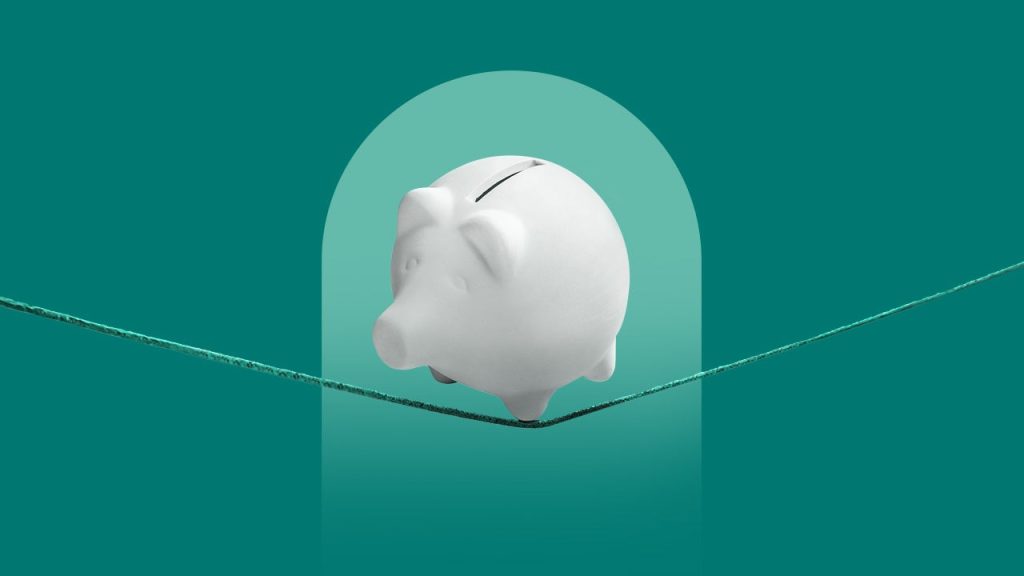To the average Americans I interact with daily, the economy feels unpredictable, with job loss, tariffs, inflation and rising costs on everything from milk to housing. I coach people across the country every Sunday — the anxiety is real and pervasive.
Instead of panicking, now is the time to focus on key money moves that will keep you financially strong, regardless of tariffs, immigration policies, federal layoffs and other moves by the Trump administration.
These five practical money goals will help you stay ahead, no matter what the economy throws your way.
Goal 1: Replenish your cash flow cushion
Economic downturns can turn into job instability and surprise expenses. Even if you haven’t been directly impacted, financial stress can sneak up on you and force you into a paycheck-to-paycheck cycle.
Money tip:
Aim to maintain at least one month’s worth of expenses sitting inside your checking account.
This is different from your emergency fund — this cushion allows your bills to run automatically, so you can focus on bigger money moves like paying off debt, investing or prepping for a job search. One of my clients recently shared their success with maintaining a cash flow cushion:
“One massive money win I had recently was something small I did based on your guidance: I made sure to keep $2,000 in my checking account as a minimum balance and now don’t feel like I am ever living paycheck to paycheck or unnecessarily stressed about money. A small action, I know, but it has had a big impact.”
How to take action now
Add up your five basic expenses from last month: housing, utilities, transportation, health, and food. Transfer that amount to your bill-paying account and keep it there as your new baseline.
Goal 2: Pay off your credit cards weekly
Interest rates are averaging 20%, and carrying a balance can get expensive fast. I work with people who weren’t irresponsible with credit cards, but a single emergency or unexpected job loss threw them behind by tens of thousands of dollars. And the interest builds up faster than they can pay it off.
Paying off your credit cards weekly instead of monthly avoids debt buildup, improves cash flow and boosts your credit score by keeping your credit utilization low.
How to take action now
Set an appointment on your calendar to pay off your balances every Friday before you clock out for the weekend. If you have extra cash after replenishing your cash flow cushion, throw it at the credit card with the lowest balance.
Goal 3: Update your LinkedIn proactively
The job market is shifting fast. Several of my clients in the D.C. area had their jobs eliminated overnight. Don’t wait until you’re laid off to refresh your resume. As a former HR professional and recruiter, I frequently witnessed how quickly a business can decide to eliminate your role. Always assume your job could go away tomorrow and be ready.
Refreshing your resume can take more effort, but your LinkedIn profile can be refreshed quickly. New employers can find you even when you’re not looking for a new role. Here are some quick, high-impact actions you can take:
- Highlight recent wins in your main bio.
- Add three recommendations to increase your visibility.
- Engage with at least one industry post a week to keep your profile active.
- Update your profile picture, location and current job title.
- Connect with at least 20 people from your past and current jobs to keep your network warm.
How to take action now
Spend 30 minutes this week updating your profile and reaching out to those 20 connections. Send a simple hello message to check in on how they’ve been doing since you last interacted. I’ve found this to be an organic way to open up dialogue proactively, versus your contacts feeling like you only reach out to them when you need their help.
Goal 4: Declutter and build savings
When your kitchen countertops or dining table are piled high with clutter, it’s easy to feel overwhelmed. I do the 30-Day Declutter Challenge with my coaching clients, and they love the sense of control it gives them when the world feels chaotic.
Start by tackling the physical clutter in your life with an exponential purge. For example,
- Day 1: Toss or sell 1 item
- Day 2: Toss or sell 2 items
- Day 3: Toss or sell 3 items
Keep going all 30 days, and by the end of the month, you’ll have cleared 465 items!
If your clutter is unallocated cash, making a plan for it will lower your anxiety. Add to your cash flow cushion to match the items you got rid of to increase your cushion by $465.
- Day 1: Save $1
- Day 2: Save $2
- Day 3: Save $3
How to take action now
Check for today’s date on the calendar. Toss or sell that many items and set the money aside for your cash flow cushion or to pay down debt. Instead of hustling on the side when you’re already exhausted, start with what you already have.
Goal 5: Audit your insurance plans
Insurance costs are overlooked by nearly all of my clients, and we often find they are either overpaying or underinsured, both of which can waste thousands of dollars. For example, if you lose your job, do you know what happens to your health insurance?
How to take action now
- Review your auto, home, and health insurance
- Shop around for better rates
- Make sure prescriptions are refilled and up to date
- Schedule medical exams now while you still have coverage
Read your health plan coverage thoroughly and figure out exactly how much you’d need to pay if your employer stops covering your insurance. After you fill your cash flow cushion, aim to have at least this much set aside in the event that you lose your coverage.
Final thoughts: Control what you can, ignore the noise
The national debt currently stands at $36.2 trillion, according to the U.S. Treasury Department. Much of the uncertainty you’re observing is the scramble to get this deficit under control — realistically, this problem won’t be solved any time soon.
But your financial habits are within your control, and with consistency, managing your money can smooth out your financial worries. If you’re feeling overwhelmed, focus on these five proactive goals to protect your cash flow, future opportunities and your peace. The goal is to future-proof your finances so you stay strong, no matter who’s in office or how the economy reacts.
Read the full article here









